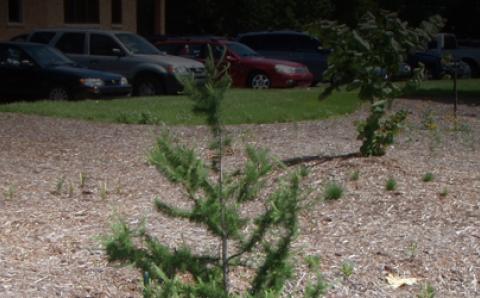I lift my eyes to the mountains—
where does my help come from?
My help comes from the Lord,
The Maker of heaven and earth.
He will not let your foot slip—
he who watches over you will not slumber.
—Psalm 121:1-3
I remember it as if it were yesterday. The day was November 13, 2010. The place, a fairy ring of redwood trees where I had spent the better part of the day at the conclusion of a five-day all-male retreat. “During your time in the woods,” retreat master Richard Rohr had promised all of us, “you will experience the change that changes everything.”
I had no idea what to expect, what I would find, what would happen to me. I just sat there quietly, surrounded by majestic trees that reached up to the heavens like Jacob’s ladder.
Earlier in the week we had participated in various rituals designed to strip away the junk we surround ourselves with in order to suppress the pain of our woundedness: our addictions, our macho posturing, our nauseating piety, our well-crafted victim status. Doing this brought us face to face with the painful realities of our broken lives, realities that were different for each man there. The truth is, life is hard.
For me, the wound was caused by having been abandoned at an early age by my father. He simply walked away, never to return. As a result, I grew up feeling different from my peers. It felt like something important was missing from my life. As an adult, looking back at the various stages of my life, it seemed as if much of the time I had been looking for a perfect father to make up for my childhood loss. All to no avail.
With that painful awareness I was sent into the woods that day, along with the promise that God wanted to touch me at the precise point of my need, to heal me with the change that changes everything. So there I sat, alone, among the trees, waiting. That’s not my style, usually, to just wait. I like to make things happen. “Don’t just sit there, do something,” was my motto. Sure enough, after a while I couldn’t stand it any longer, so I took out pen and paper and began to write.
Bitterly, angrily, I wrote down the name of a man I knew. Why couldn’t he have been my father? And then another name. Why couldn’t I have been his son? And what about him, he was a cool dude. And so on and so on. He would have been great, as would he, and he, and he. . . . The list grew.
And then it hit me. As I looked over the list of names of men God had placed in my life at one time or another, I realized that even though none of them individually had been a perfect father to me, between all of them God had provided me with some amazing fathering over the years.
One of those men had taught me to work with my hands. One shared with me his love of books. One was an excellent listener. One gave me a place at his table when I needed it. One was always able to boost my confidence. One tried to tell me about women as best he could. Another showed me how to be a parent.
In fact, the more I thought about it, the more it occurred to me that the partial, limited, incomplete fathering of all these men together added up to better fathering than many boys receive from their own fathers who are in their lives for many decades. God had richly blessed me throughout the years, but I had failed to see it because I had been looking for that blessing in a different form.
So there it was: the change that changed everything.
Everything? Let me tell you what happened next. Not too long ago, I shared breakfast with a friend. As we often do, we found ourselves commiserating about how our pastor is failing us in any number of ways. Then we remembered another friend, who happens to be an incessant whiner, and we said to each other: “It seems like he is just looking for a perfect pastor to magically make all his problems go away.”
And then it hit me again: It wasn’t just our whining friend who was looking for a perfect pastor. I was too. Somehow I had bought into the notion that the only real and valid and meaningful pastoring God was going to provide for me would have to come to me through the person of our church’s pastor.
But what if the person with the title “pastor” isn’t always there? What if she isn’t very good at providing pastoral care? What if there are too many other people who need his pastoral attention? And, much more important, why am I limiting God to provide for my needs only in the one way I have decided it should be done? What if God wants to meet your and my need for pastoring through others: a fellow church member, a spouse, a neighbor, a coworker, a teacher, a student, or even the family dog? After all, how many of us are blessed by the unconditional acceptance of a loving pet in times of loneliness or despair?
And here’s the real question: Can we allow God to meet our needs in the way he thinks is best? Can we look for pastoral care from sources other than the “official” pastor? Can we recognize that care when it is provided for us in other ways? Can we accept it whenever it is lovingly offered? Or are we too busy whining that the “real” pastor isn’t doing his or her job well enough according to our expectations?
Perhaps the real problem is with our expectations. Perhaps we have not yet honestly faced up to what we really need to heal our wounded hearts.
So I, for one, am going to let my pastor off the hook and let him be whatever God wants him to be.
How about you?
About the Author
John Vandonk is a former CRC pastor, who enjoyed several other careers along the way, (including construction, dairy manager, and pool and spa equipment technician), but has now retired and, when not hanging out with grandkids, helps out at CrossPoint CRC








